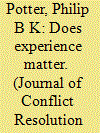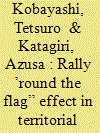| Srl | Item |
| 1 |
ID:
077419


|
|
|
|
|
| Publication |
2007.
|
| Summary/Abstract |
This article demonstrates that the probability of an international crisis involving the United States declines as a presidential administration gains time in office. This finding invalidates three widely held theories about the relationship between the American democratic cycle and foreign policy that (1) there might be a honeymoon period immediately following election in which new presidents are unlikely to become involved in foreign crises, (2) presidents might systematically use the ``rally round the flag'' effect to bolster their electoral prospects, or that more generally, (3) foreign policy might be primarily tied to the democratic constraints of the electoral cycle. This finding also stands in partial contrast to recent work suggesting that, globally, leadership experience does not influence the likelihood of a militarized interstate dispute, while leader age does. The differing conclusions are the result of both the unique American case and the differing formulations of conflict
|
|
|
|
|
|
|
|
|
|
|
|
|
|
|
|
| 2 |
ID:
117590


|
|
|
|
|
| Publication |
2012.
|
| Summary/Abstract |
Previous research has shown that foreign policy crises can cause a 'rally 'round the flag' effect, boosting citizens' approval of their leaders. While scholars agree on the effect's existence, its magnitude and nature are less readily apparent. This article considers two factors that have been neglected in previous studies: the context in which a conflict occurs and the public's level of trust in government. The theory presented here suggests that trust is not only an effect of a rally, but mediates the magnitude of the rally. It also proposes that the nature of the rally will be unaffected by whether the state is provoked by its opponent prior to crisis initiation. The resulting hypotheses are tested using aggregate US public opinion data around international crises, as well as individual-level data from the 1990-92 ANES panel regarding the Persian Gulf War. The analysis indicates that trust in government has a major influence on the size of a rally effect, especially at the individual level. However, trust matters more for those in the opposition than for those who have supported the government in the past. These results suggest implications for understanding public attitudes toward foreign policy and for the diversionary theory of war.
|
|
|
|
|
|
|
|
|
|
|
|
|
|
|
|
| 3 |
ID:
166147


|
|
|
|
|
| Summary/Abstract |
This study examines the impact of China's growing territorial ambitions on Japanese public opinion. By experimentally manipulating perceived territorial threats from China, we tested two potential mechanisms of increased support for a conservative incumbent leader in Japan. The first is the “rally ’round the flag” model, in which threats universally boost support for the leader through emotion. The second is the “reactive liberal” model, in which support from conservatives remains constant, but threatened liberals move toward supporting the conservative leader. Two survey experiments provided no support for the emotion-based “rally ’round the flag” model, but they lent support for the reactive liberal model in explaining the impact on Japanese public opinion. However, the second experiment indicated that priming with an image of the prime minister that highlights his role as the supreme commander of the national defense forces completely eliminated the gain in approval rates among liberals.
|
|
|
|
|
|
|
|
|
|
|
|
|
|
|
|